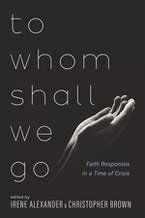Irene Alexander and Christopher Brown (editors),
To Whom Shall We Go? Faith responses in a time of crisis,
Cascade 2021
Paperback ISBN 9781725289550
Hardback ISBN 9781725289567
eBook ISBN 9781725289574
Available from the publishers, Koorong, or from the authors at holyscribblers.blogspot.com
Hardback $40, eBook and Paperback $25
Reviewed by Ted Witham
Part of us wants to pretend the Coronavirus pandemic has not happened, and that the Church can go back to its old ways after the worst of this is over. I have no doubt, however, that there will be enduring changes, not least in the way Church organisations use technology.
The collective of Christian writers behind To Whom Shall We Go, who call themselves the “Holy Scribblers”, are also convinced of permanent change. Their interest, as shown in this series of eleven essays, is in changes to our spiritual lives more than technology.
The book is loosely structured around the Beatitudes and this structure gives the book an optimistic feel: we Christians will be stronger and our faith will be deeper – we will be more blessed – because of living through this moment. Their grounds for optimism are historical. We have before lived through past pandemics and challenges and emerged changed and stronger.
The authors are an eclectic mix of academics and thinkers who are looking for thoughtful Christian readers, clergy and lay. Two Franciscan Tertiaries, Terry Gatfield and Charles Ringma, are among the contributors. As is always the case with essays from diverse authors, individual readers will find some essays stronger than others. For example, Chris Mercer’s explorations of Desert Father Evagrius’ “eight deadly thoughts” (gluttony and lack of thankfulness for food, sexual lust, sadness, boredom and apathy, vainglory and pride) resonate for me.
I have some quibbles with the structure of the book. Each section gave rise to prayers and questions for reflection. The reflection questions were at the very end of the book. In the eBook format, especially without hyperlinks, this rendered the questions almost useless.
The prayers were crafted along quite traditional lines, so some could be used or adapted, for example, for intercessions at the Eucharist. I found them a bit too stolid, with none of the creativity of the stunningly beautiful prayers of another Australian, Craig Mitchell, in his recent Deeper Water (Mediacom).
To Whom Shall We Go is a timely book and will stimulate lively thinking about where God is now leading God’s Church.

